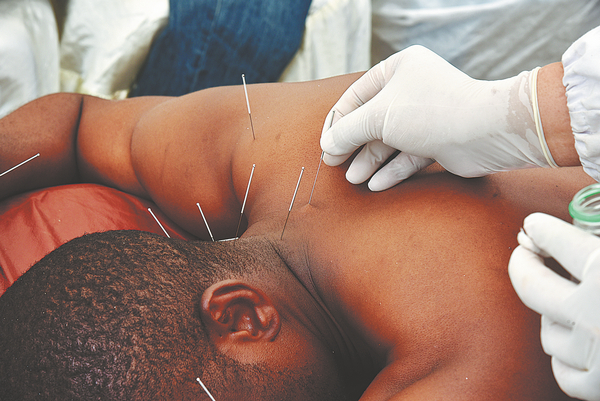
When Cameroonian health authorities announced that experts of traditional Chinese medicine will be providing lectures on TCM, Eunice Nchang was among the first to arrive at the lecture hall.
A medical worker with extensive experience in the treatment of injury, disease and disorders through physical methods, Nchang had witnessed the palpable results of TCM on her patients.
Five years ago, a middle-aged woman with a back injury made a three-hour journey to Gynaeco-Obstetric and Paediatric Hospital in the capital Yaounde where Nchang works, to get treatment and she was referred to the acupuncture unit of the hospital.
She grimaced as a Chinese acupuncturist inserted fine needles in her skin at specific points. But moments later, a smile broke out on her face.
Nchang watched the scene and was amazed with the results.
She made up her mind to learn more about TCM but there was no time or opportunity. On Dec 15, that opportunity came.
Two TCM experts who are part of the 21st batch of the China medical team in Cameroon held daylong lectures on TCM for medical personnel at the Gynaeco-Obstetric and Paediatric Hospital.
About 50 nurses and doctors turned up for the lecture. Nchang says the training was of immense importance to her.
“It will help me (because), first of all when somebody comes and complains to me, I have to know whether you are going to the physiotherapist or you are going to acupuncture. It will improve my skills because if there are too many patients in acupuncture and they need assistance, I will go and work there,” the 37-year-old physiotherapist says.
Charles Ngiyo, head of physiotherapy unit of the hospital, says he was not only looking for knowledge in acupuncture, but also wanted to discover Chinese culture, especially the philosophy of TCM.
Modern medicine, let alone basic healthcare, is a luxury for many of the country’s 25 million people.
Fees at state-run hospitals have soared in recent years, and the government has pledged to spend more on basic health services, but expensive public healthcare ensures a steady stream of patients to TCM, where relief may be as cheap as inserting needles in the skin to alleviate pain or to help treat various health problems, without undesirable effects on the patients, says Ngiyo.
“This training comes at the right time because when you look at the importance of acupuncture in Cameroon particularly in our hospital, you just see that they are having a lot of patients,” says the 59-year-old who actively took part in the training.
“People want to go for new treatment because they are tired of the old treatment on drugs. As we have new techniques brought in by the Chinese people, we want to also discover all these things,” he adds.
Traditional Chinese healthcare and medicines are very popular and one needs to travel to China to learn more about it, says Robinson Mbu Enow, director-general of the Gynaeco-Obstetric and Paediatric Hospital.
“Fortunately for us, we have among us, a professor of traditional Chinese medicine. So we are using the opportunity of his presence to have our people trained. This has never happened before in our country, this is the first time. So we want to begin with it and hope we can go further,” Enow said during the training.
“This bilateral collaboration with the government of China is very good and we are really getting the best of it. This initiation should be an opening of creating a center for Chinese traditional medicine here in our hospital,” adds Enow who officiated the opening and closing of the training.
Wang Haijun, 44-year-old acupuncturist who trained the medical workers, explains that the training had four stages-the basic theory of TCM; transfusions of meridians; acupuncture manipulation skills and clinical acupuncture treatment.
“We had a lot of mutual activity. I think this training is very successful. I think seeing the people here confirms acupuncture is the most sought for. This is not the end, it’s just starting,” Wang said after the training.
Nchang says she hopes to travel to China one day to further her knowledge of TCM.
“What we are doing here is not really detailed. I have to learn. I don’t just have to leave from here and go practicing what I don’t know. What they have given us here is not enough for me to be practicing at 100 percent,” she says.